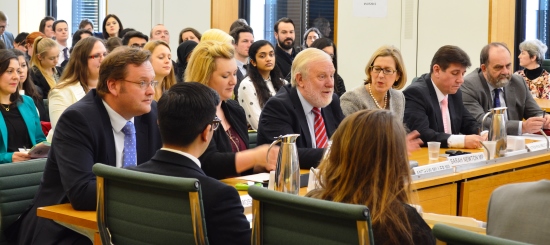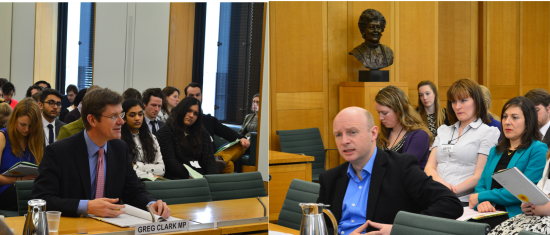News
Young scientists quiz MPs and Ministers at Voice of the Future 2015
- Details
- 04 March 2015
Science Minister Greg Clark and other senior scientific figures faced a raft of questions on UK science from young scientists today at the Society of Biology’s fourth Voice of the Future event.

Watch Voice of the Future in full on BBC iPlayer or the STC website.
As part of the annual event, a panel of young researchers aged between 16 and 35 were invited to quiz a variety of key political figures, including the Government's Chief Scientific Advisor and members of the House of Commons Science & Technology Select Committee.
Labour MP Andrew Miller, chair of the committee, stressed how important it was that young scientists engage with such committees and their MPs to inform them on important scientific issues. He told the young attendees to make sure their visit to Parliament 'is not a one off'.
“Committees such as this are only as informed as the people who are willing to get involved, who speak to us and get the scientific messages across. You can’t whinge that MPs get things wrong if you haven’t engaged in the process,” he said.
Miller, who steps down as chair this year, was asked which of the committee’s recommendations that had been ignored by the Government, he thinks should be reconsidered. He said the Home Office has ‘screwed up’ the forensic science service and that a miscarriage of justice would inevitably result; and that he hoped exam regulator Ofqual would reconsider their reforms to the practical element of science A level and GCSE qualifications.
Under questioning from young scientists, other members of the Science and Technology Committee admitted that many of their colleagues in the House of Commons struggled to understand the most basic scientific issues coming before them.
Liberal Democrat MP David Heath said some of his colleagues 'do not understand even basic concepts in the scientific process'.
“Specifically, people do not understand risk. If you could get that into people’s heads they would be less prone to believing the next scare story and coming to the wrong conclusions.”
Conservative MP Stephen Metcalfe told young delegates that a shortcut to getting the attention of an MP on a scientific issue was to make it relevant to their constituents. “MPs face a cacophony of voices on hundreds of issues all the time. But MPs are inherently interested in constituency matters and that is a good way of cutting through that noise.”

Science Minister Greg Clark (above left) said science required 'confidence and stability' and pointed to the five key messages for the next 10 years of science in the UK set out in his Science and Innovation Strategy. “We've protected the science budget and increased capital investment,” he said.
Shadow Science Minister Liam Byrne (above right) said Labour would ring fence science spending for ten years, and said the German aim to spend 3% of GDP on research and development was the 'right level of ambition'.
The Government’s Chief Scientific Advisor Mark Walport stressed that the UK has the best-embedded scientific advice of any government in the world, and said scientific committees such as the Scientific Advisory Group in Emergencies (SAGE) had proved to be extremely valuable in the recent flooding and Ebola crises.
Voice of the Future is an annual event organised by the Society of Biology which invites young scientists to represent scientific organisations including: the Society of Biology, the Institute of Physics, the Council for the Mathematical Sciences, The Royal Society of Edinburgh, the Biochemical Society, the British Pharmacological Society, the Society for Experimental Biology, the Royal Society of Chemistry, the Society for Applied Microbiology, the Society for Endocrinology, The Geological Society and the Society for General Microbiology.
Read more about the Society of Biology's representatives: Siobhan Gardiner, Bethan Wolfenden, Kelly Chaplin and Alison Cryan.
Watch Voice of the Future in full on BBC iPlayer or the STC website.
See a social media summary on our Storify.

